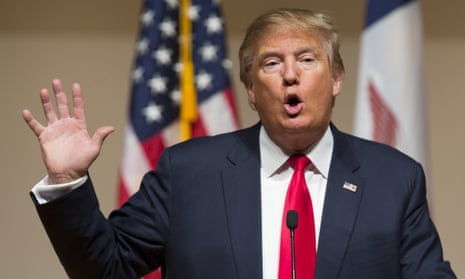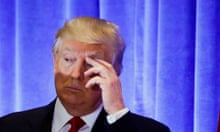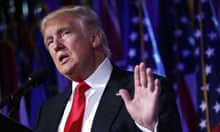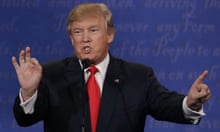Donald Trump’s cancellation of a news conference about potential conflicts of interest between his presidency and his business dealings has only sharpened concerns. With roughly one month to go until the inauguration, a sense of urgency is building around Trump’s need to clarify his plans for his business.
The perceived hazard is not only potential self-dealing by Trump – who could conceivably use the presidency to boost his real estate developments at home or abroad, guide justice department activity, or renegotiate debts or leases – but also potential blackmail or bribery of Trump or his family members or associates based on their significant debts or other liabilities around the world.
Here are the key questions in play:
What’s the big deal?
Nobody knows, exactly, because Trump has not released his tax returns, thereby hiding what he owns and what he owes. Any such analysis as presented in this Q&A, in fact, proceeds in moonless darkness. But financial disclosures by Trump, a few extant tax documents, and estimates of Trump’s assets by Forbes, which in September pegged Trump’s net worth at $3.7bn, and others give us a picture to work with.
Can’t a president be in business?
Yes. The nonpartisan Office of Government Ethics advised Congress on Tuesday that “it has been the consistent policy of the executive branch that a President should conduct himself ‘as if’ he were bound by ... financial conflict of interest law”. But it’s not clear that the president is in fact bound by said law. (There’s not much precedent here to work with.) The emoluments clause of the constitution bans gifts from foreign entities to US officeholders, but there’s some debate about whether the clause applies to the presidency. Trump himself does not believe that the law “mandates” that he leave his businesses.
What’s the worst that could happen?
That’s a tough one. Trump may scrupulously avoid using his political power to grow his fortune, to do his friends favors, or to benefit his children. Or he may commit an unprecedented ethics violation. The nature of such a potential violation is easy to imagine, although the examples we list here are speculative.
Trump could sign a weapons deal in exchange for a write-down on the hundreds of millions of dollars his companies owe to foreign banks. Trump could turn a blind eye on a Russian incursion in Estonia after his long-desired tower project in Moscow suddenly gets the green light, in what is publicized as the first business mega-score of the Donald Jr-Eric Trump team. Trump’s administration could drop a protest about human rights abuses in the Philippines after his Manila real estate project gets a valuable easement or some such boost. A Trump-appointed director of the general services administration could decide for some reason to shrink the lease the Trump organization must pay the federal government to run its hotel in the Old Post Office Pavilion in Washington DC.
We should emphasize that we’re not accusing Trump of being inclined to or capable of any of this – we’re just spitballing here. Trump’s willingness to allow questions to linger about whether he will divest from his businesses, after announcing that he would answer those questions definitively, is no discouragement to the imagination on this score.
Calm down. Trump is a patriot who loves America and would not subjugate its interests to his own
The level of risk of Trump’s conduct as an entrepreneur bleeding into his conduct as president is unclear. How strong is Trump’s desire to make money? His previous attempts at self-enrichment have ranged from casinos to branded liquor to a sketchy university.
Understand that the potential hazard here is not only Trump’s greed. Money he owes foreign banks, or secret foreign investors, or domestic banks or investors – or his desire to protect his assets abroad, or to create a favorable climate for the growth of those assets – or something we don’t know about could make him or his family members vulnerable to pressures from actors less scrupulous than he may be.
What does Trump intend to do?
We don’t know. He has made multiple statements. His lawyer, Michael Cohen, said two days after the election that Trump’s assets would be put in a “blind trust” to be managed by his three oldest children. Many experts have pointed out that it’s not blind if you know what’s in there and have a sense for how it’s run. The appointment of Trump’s children to his transition team further eroded their status as potential independent managers.
On 30 November, Trump unleashed a Twitter storm announcing the news conference he cancelled Tuesday. “I will be holding a major news conference in New York City with my children on December 15 to discuss the fact that I will be leaving my great business in total in order to fully focus on running the country in order to MAKE AMERICA GREAT AGAIN!” Trump tweeted. “While I am not mandated to do this under the law, I feel it is visually important, as President, to in no way have a conflict of interest with my various businesses.”
Hence, legal documents are being crafted which take me completely out of business operations. The Presidency is a far more important task!
— Donald J. Trump (@realDonaldTrump) November 30, 2016
On 12 December, Trump announced a new plan, and said he was busy.
“Even though I am not mandated by law to do so, I will be leaving my busineses [sic] before January 20th so that I can focus full time on the Presidency,” Trump tweeted. “Two of my children, Don and Eric, plus executives, will manage them. No new deals will be done during my term(s) in office.”
I will hold a press conference in the near future to discuss the business, Cabinet picks and all other topics of interest. Busy times!
— Donald J. Trump (@realDonaldTrump) December 13, 2016
The timing was left vague. Trump’s spokeswoman said the news conference would be left until next month.
What’s Congress doing about this?
Twenty-three senators – not even half of the Democratic caucus – sent a letter to Trump on Tuesday calling on him to divest his business holdings and insisting: “Whether the President of the United States makes decisions about potential trade agreements or sending troops into war, the American people need to know that their President is acting in their best interest.
“In your public statements, you have referenced that the President is not subject to the restrictions of federal conflict of interest laws,” the letter read in part. “However, we understand the Office of Government Ethics has advised presidents across administrations to conduct themselves in a manner consistent with federal conflict of interest laws and standards of conduct regulations. The President is subject to the Emoluments Clause of the United States Constitution, which will prohibit payments or gifts to your businesses by entities owned by foreign governments.”
Separately, Senator Elizabeth Warren and Representative Elijah Cummings asked the government to open an investigation of possible conflicts of interest for Trump in his transition to the presidency and after he takes office.
“At this point, it is not clear if the line between Mr Trump’s Presidency and his and business ventures is blurred – or entirely nonexistent,” the two said in a 23 November letter to the comptroller general asking for a review by the Government Accountability Office.
The letter continued:
Several weeks ago, the general counsel for the Trump Organization, Michael Cohen, explained that Mr Trump will transfer management of the Trump Organization to his adult children, who will run the company “through a blind trust”. But claims that Mr Trump’s will set up a “blind” trust do not appear to be consistent with the meaning of that term or with legal requirements that apply to such trusts. A qualified blind trust, which must be approved by the Office of Government Ethics, would allow Mr Trump to forgo reporting the details of some assets in his financial disclosures. The Ethics in Government Act explicitly prohibits Mr Trump’s children from managing such a trust. The Act requires that, “Any officer or employee of a trustee or other entity who is involved in the management or control of the trust of a qualified trust” not be “a relative of any interested party”. To date, there has been no information released to the public indicating that Mr Trump has prepared a blind trust.









Comments (…)
Sign in or create your Guardian account to join the discussion